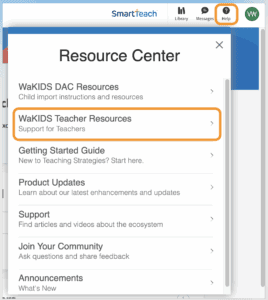
The Washington Kindergarten Inventory of Developing Skills assists school districts in the identification of each TK/Kindergarten student’s readiness levels regarding their knowledge, skills, and abilities throughout multiple content and development areas, including math, literacy, and social-emotional development. Executive functioning skills are also assessed within academic learning environments using this research-based inventory, which includes small-group prompts. This observational process allows kindergarten teachers to assess groups of children at one time.
Implementation Supports for WaKIDS Teachers and Administrators

WaKIDS FAQs
Visit the GOLD Support Portal and the Resource Center in SmartTeach
For Teachers
Fall Checkpoint: August 1, 2025 – November 15, 2025 Winter Checkpoint: November 21, 2025 – March 15, 2026 Spring Checkpoint: March 16, 2026 – June 15, 2026

You can access GOLD Support Portal articles and videos to learn more about how to incorporate GOLD features and functionality into your day-to-day teaching and learning practices. Within SmartTeach, teachers can access the following features.
For WaKIDS 101 support, reach out through this email address: [email protected] For technical assistance implementing the WaKIDS process, click the link below.
If you do not see children in your SmartTeach class, they have not been added to your account. Please contact your building administrator and/or District Assessment Coordinator to import your roster into the system. DO NOT ADD CHILDREN YOURSELF.
Your building administrator can connect with your DAC. You can also check this link for more information and scroll down to the District Test Coordinator information.
This support article can help you finalize checkpoints: https://teachingstrategies.my.site.com/portal/s/article/How-do-I-finalize-checkpoints When you have entered checkpoint ratings for each objective and dimension within an area for each child in your class, you can finalize that area to fully complete your checkpoint entry for that area. You can finalize an area directly after entering ratings for the last item in an area, or you can come back to the Checkpoint dashboard to finalize at a later time.
OSPI requires teachers to collect at least one piece of documentation to support their assessment as they assign levels to children’s skills, knowledge, and abilities. This means one piece of documentation per child per objective and dimension. However, teachers can leverage one piece of documentation for multiple objectives, dimensions, and children.
Interrater Reliability Certification in SmartTeach is an online certification process that allows teachers to evaluate sample child portfolios and compare their ratings with those of the anchor scores from Teaching Strategies. Receiving your IRR Certification means that your ratings of children’s knowledge, skills, behaviors, and abilities agree with the ratings determined by GOLD®. Think of the IRR as a norming assessment to ensure that what you consider a level 6 is what another teacher considers to be a level 6. For more information, you can access this link.
For Administrators
Fall Checkpoint: August 1, 2025 – November 15, 2025 Winter Checkpoint: November 21, 2025 – March 15, 2026 Spring Checkpoint: March 16, 2026 – June 15, 2026
For technical assistance implementing the WaKIDS process, click the link below. Please remember that DAC-specific questions, such as those involving child import, can also be answered using this email address: [email protected]
You can request a copy from OSPI through this email address: [email protected]

The WaKIDS Whole-Child Assessment data can be used for the following purposes. 1. To provide targeted support to children who entered kindergarten with skills and abilities below expectations 2. To share with specialists and other district staff to guide instructional planning 3. To prompt further investigation about children’s strengths and needs, including as part of the information for highly capable and special education services 4. To share with families, including at conferences and with report cards 5. To look for trends in student needs to prioritize resources for targeted support to schools and classrooms 6. To track student growth across the TK/kindergarten year 7. To determine professional development needs, including with community preschool teachers 8. To prepare reports for conversations with local early learning providers 9. To share with the school board and community stakeholders
Your Regional Sales Representatives
Our dedicated team of regional sales representatives is ready to support you and your early childhood program. Contact your state sales representative at 855-448-4352 or use the form below with any questions, requests, or to order our resources.

